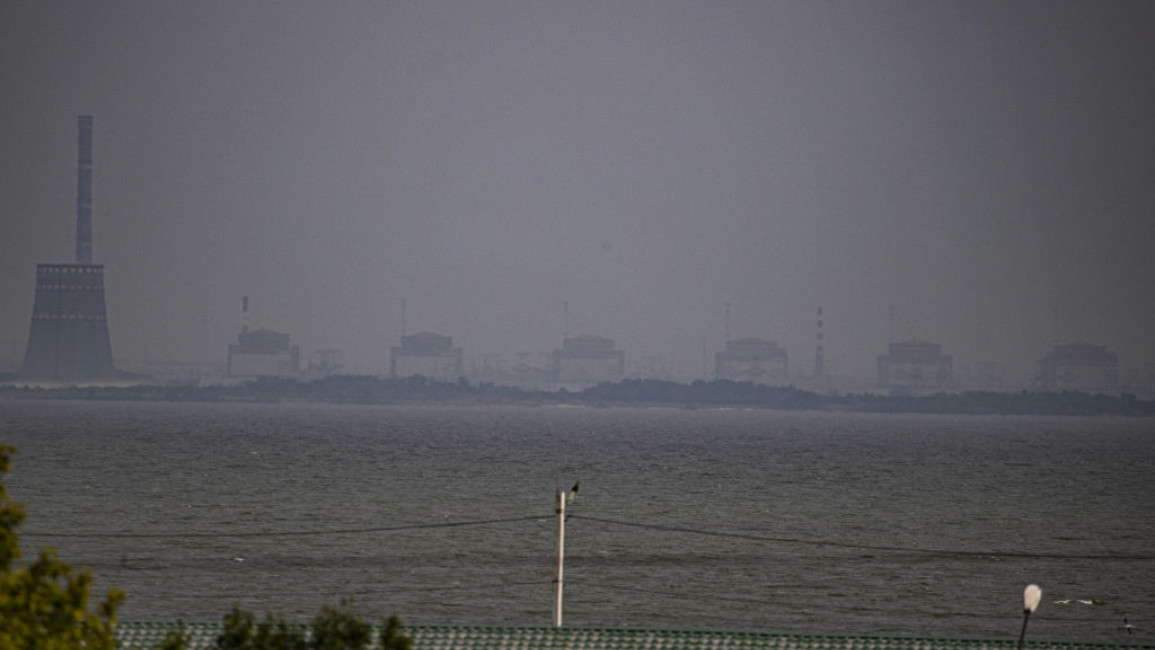Putin allows inspectors to visit Russia-held nuclear plant via Ukraine
Russian President Vladimir Putin has agreed for a team of independent inspectors to travel to the Moscow-occupied Zaporizhzhia nuclear plant via Ukraine, the French presidency said on Friday.
The apparent resolution of a dispute over whether inspectors travel to the plant via Ukraine or Russia came as a senior US defence official said Ukraine's forces had brought the Russian advance to a halt.
"You are seeing a complete and total lack of progress by the Russians on the battlefield," the official said, speaking to reporters on grounds of anonymity.
According to French President Emmanuel Macron's office, Putin had "reconsidered the demand" that the International Atomic Energy Agency travel through Russia to the site, after the Russian leader himself warned fighting there could bring about a "catastrophe".
It specified that Putin had dropped his demand that the IAEA team travel to the site via Russia, saying it could arrive via Ukraine.
The UN nuclear watchdog's chief, Rafael Grossi, "welcomed recent statements indicating that both Ukraine and Russia supported the IAEA's aim to send a mission to" the Zaporizhzhia nuclear plant.
The agency was "in active consultations with all parties" towards sending one as soon as possible, Grossi said..
Meanwhile, UN chief Antonio Guterres urged Moscow's forces occupying the Zaporizhzhia plant in south Ukraine not to disconnect the facility from the grid and potentially cut supplies to millions of Ukrainians.
A flare-up in fighting around the Russian-controlled nuclear power station -- with both sides blaming each other for attacks -- has raised the spectre of a disaster worse than in Chernobyl.
The Kremlin said earlier that Putin and Macron agreed that the IAEA should carry out inspections "as soon as possible" to "assess the real situation on the ground".
Putin also "stressed that the systematic shelling by the Ukrainian military of the territory of the Zaporizhzhia nuclear power plant creates the danger of a large-scale catastrophe", the Kremlin added.
The warning came just a day after Turkish leader Recep Tayyip Erdogan and Guterres, meeting in the western Ukrainian city of Lviv, sounded the alarm over the intensified fighting, and Ukrainian President Volodymyr Zelensky urged the United Nations to secure the site.
The Turkish leader said: "We are worried. We do not want another Chernobyl," referring to the 1986 nuclear disaster, while Guterres cautioned that any damage to the plant would be akin to "suicide".
During his visit to the southern port of Odessa on Friday, the UN secretary general said: "Obviously, the electricity from Zaporizhzhia is Ukrainian electricity. This principle must be fully respected".
"Naturally, its energy must be used by the Ukrainian people," he told AFP in separate comments.
His remarks came after Ukrainian energy operator Energoatom alleged that Russian troops were planning to "shut off the reactors" at Zaporizhzhia, which is capable of supplying four million homes.
On Thursday, Moscow said Kyiv was preparing a "provocation" at the site that would see Russia "accused of creating a man-made disaster at the plant".
Kyiv, however, insisted that Moscow was planning the provocation, and said Russia's occupying forces had ordered most staff to stay home Friday and drawn down officials from Russia's own state nuclear agency.
Guterres was visiting Odessa as part of an appeal to make Ukrainian grain available to poor countries struggling with soaring food prices, after a landmark deal with Russia last month to allow its export.
Earlier, the UN chief met Erdogan -- who helped broker the grain deal inked in Istanbul -- and Zelensky, saying the United Nations hoped to scale up work under the deal ahead of the winter.
The deal, the only significant agreement between Russia and Ukraine since Moscow invaded in February, has so far seen 25 boats carrying some 600,000 tonnes of agricultural products depart from three designated ports, Kyiv has said.
But during the call with Macron -- their first in nearly three months -- Putin told the French leader that Russia was facing obstacles in the export of its food products and fertiliser.
"There are still obstacles to... Russian exports that do not contribute to the solution of problems related to ensuring global food security," the Kremlin said.
Guterres is expected to head to Turkey after Odessa to visit the Joint Coordination Centre, the body tasked with overseeing the accord.
The agreement between Kyiv and Moscow to clear exit corridors from three Ukrainian ports, including Odessa, has brought some relief to concerns of global food shortages with the warring countries among the world's leading producers.
The deal has held, but brought little respite along the sprawling front lines in eastern Ukraine, where Russian forces have edged slowly forward after nearly six months of fighting.
The primary tool of Moscow's forces has been artillery barrages, and recent bombardments over the eastern Donetsk region -- which has been partially controlled by Russian proxies since 2014 -- left several dead.
The Ukrainian head of the region, Pavlo Kyrylenko, said on social media Friday that Russian strikes had killed five people and wounded 10 more in three settlements.
Strikes early Friday in Kharkiv, Ukraine's second largest city, left one person dead and damaged a school and a private business, the head of the region said. Russian strikes around Kharkiv have killed more than a dozen people over the last two days.



